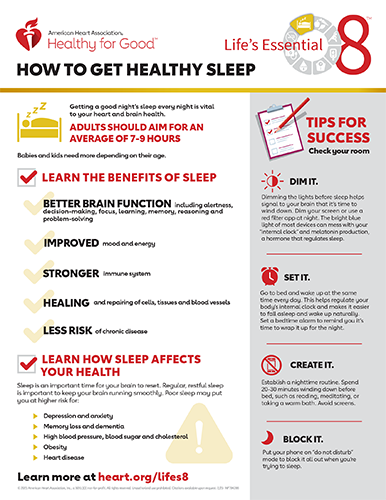Blue light has become a prevalent part of children’s daily lives, especially with the increased use of electronic devices. This type of light is emitted from smartphones, tablets, computers, and televisions, and it can have a significant impact on kids’ sleep patterns. Understanding how blue light affects children’s sleep is essential for parents and caregivers who want to prioritize their children’s rest and well-being.
What Is Blue Light?
Blue light is part of the visible light spectrum and is known to have a shorter wavelength and higher energy compared to other types of light. It is naturally present in sunlight and plays a role in regulating the body’s internal clock or circadian rhythm. However, exposure to artificial sources of blue light, particularly in the evening and nighttime, can disrupt this natural rhythm, leading to various sleep-related issues.

Credit: www.heart.org
The Science Behind Blue Light and Sleep
When children are exposed to blue light from electronic devices, it can interfere with the production of the sleep hormone melatonin. Melatonin helps regulate the sleep-wake cycle, and its secretion is typically triggered by darkness. Blue light exposure, especially in the hours leading up to bedtime, can suppress melatonin production, making it harder for kids to fall asleep and stay asleep.
Impact on Children’s Sleep
The consequences of excessive blue light exposure can be detrimental to children’s sleep patterns. It can lead to difficulties falling asleep, frequent waking during the night, and overall decreased sleep quality. As a result, kids may experience daytime drowsiness, irritability, and difficulty concentrating, affecting their academic performance and overall well-being.
Managing Blue Light Exposure
While it may be challenging to completely eliminate blue light exposure, especially in today’s digital age, there are practical steps parents can take to minimize its impact on children’s sleep. Here are some strategies to consider:
- Set Screen Time Limits: Establishing specific time limits for electronic device usage, especially in the evening, can help reduce blue light exposure and promote healthier sleep habits.
- Use Blue Light Filters: Many devices offer built-in blue light filters or “night mode” settings that can be activated to reduce the emission of blue light during nighttime use.
- Promote Sleep-Friendly Activities: Encouraging alternative activities before bedtime, such as reading a book, engaging in calming routines, or listening to soft music, can help transition children to a more relaxed state conducive to sleep.
- Create a Dark Sleep Environment: Minimize ambient light in the bedroom by using blackout curtains, dim nightlights, and ensuring that electronic devices are turned off or removed from the sleeping area.

Credit: www.amazon.com
The Importance of Healthy Sleep Habits
Ensuring that children get an adequate amount of quality sleep is vital for their growth, development, and overall health. By addressing the impact of blue light on kids’ sleep and implementing measures to mitigate its effects, parents can support their children in establishing healthy sleep habits that contribute to their well-being and academic success.
In conclusion, understanding the influence of blue light on children’s sleep is crucial in today’s technology-driven environment. By being mindful of blue light exposure and taking proactive steps to manage it, parents can help their kids enjoy restful and rejuvenating sleep, setting the stage for a brighter and more energetic tomorrow.
Frequently Asked Questions On How Blue Light Disrupts Kids’ Sleep: Effective Ways To Protect Their Rest
How Does Blue Light Affect Kids’ Sleep?
Blue light from electronic devices can disrupt the sleep-wake cycles of children, making it harder for them to fall asleep.
Why Is Blue Light Harmful To Kids’ Sleep?
Blue light suppresses the production of melatonin, the hormone that helps regulate sleep, making it difficult for kids to fall asleep and stay asleep.
How Can Blue Light Exposure Impact Kids’ Overall Health?
Excessive blue light exposure can lead to various health issues in children, including poor sleep quality, increased risk of obesity, and potential eye strain.
Can Blue Light Affect Academic Performance In Kids?
Yes, disrupted sleep due to blue light exposure can negatively impact cognitive function and affect academic performance in children.
Leave a Reply